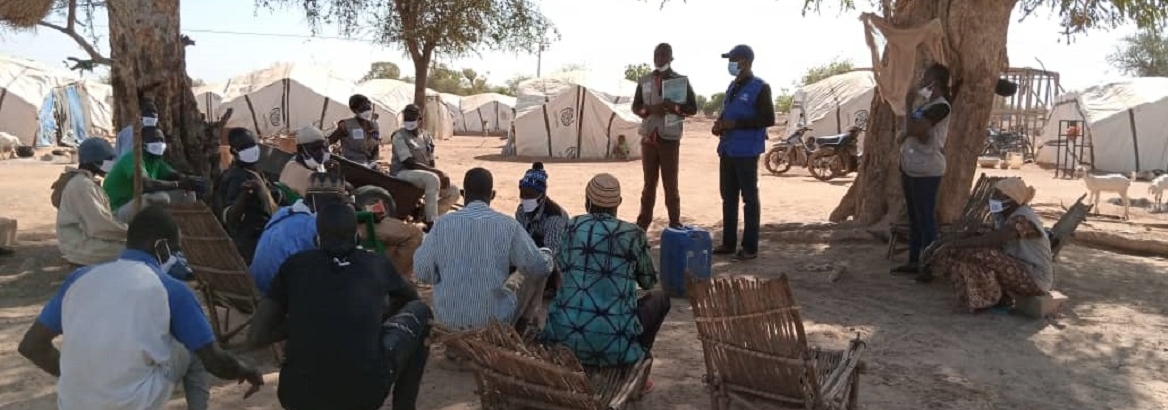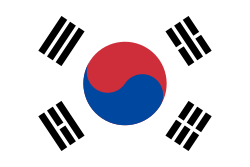IOM Vision
Through an evidence-based and conflict-sensitive approach, IOM Burkina Faso provides assistance to meet the multi-sectoral needs of internally displaced persons (IDPs), host communities and other crisis-affected communities, notably through the Government’s Expanded Emergency Plan for the Sahel (2019-2021), as well as through established international humanitarian coordination mechanisms. Following the recommendations of the Central Sahel Pledging Conference (October 2020), IOM’s response focuses on operationalizing the humanitarian-development-peace nexus, through strengthening social cohesion and local governance, and contributing to an enhanced humanitarian response.
Objective
Saving lives and protecting people on the move
- Direct beneficiaries: IDPs, host families, refugees, migrants, other affected households.
- Indirect beneficiaries: Ministry of Women, Family, National Solidarity and Humanitarian Action, Conseil National de Secours d'Urgence et de Réhabilitation (CONASUR, entity under the Ministry of Women, Family, National Solidarity and Humanitarian Action), Direction of Non-Communicable Disease Prevention and Control (DPCM), local authorities and partners.
IDPs affected by the ongoing crisis, currently largely reside within and among host communities, in temporary reception centres that have been set up by the Government (such as schools), in spontaneous settlements, or actual IDP sites established on identified land provided either by the Government or private landowners. IOM seeks to:
- Ensure access to basic services, and improve living conditions for displaced persons through site management activities such as the coordination of basic services, community participation and engagement, including risk communication and community engagement on all topics relevant for the communities, and site improvement works.
- Engage in building and reinforcing capacities of both the government and humanitarian partners in this activity area.
Within the current unstable context, both the psychosocial well-being of individuals and the resilience of displaced and host communities are impacted. Added to this, COVID-19 further limits and restricts access to basic social services and rights. As part of its Protection in Humanitarian Action approach, which is aligned with the key protection principles from the Inter-agency Standing Committee (IASC) and the centrality of protection, as well as in cooperation with key government partners, in particular the Ministry of Women, National Solidarity, Family and Humanitarian Action, IOM will conduct protection activities to contribute to fulfilling the needs, assisting, and upholding the rights of displaced and affected populations and stranded migrants. Based on identified needs and its global expertise, IOM proposes to:
- Deploy protection mobile teams that will carry out community-based protection activities, notably structured and culturally appropriate social, ritual and recreational activities for adults, adolescents and children, including awareness-raising and information activities on topics identified as relevant and relevant to the context by teams and the communities themselves.
- Provide support to women and girls, including activities on prevention, mitigation and response to gender-based violence (GBV), as well as referral to specialized services.
- Combat trafficking in persons (TiP) in crises, through the development of a strategy, mapping of services, awareness-raising among communities at-risk and capacity-building of key government and non-government stakeholders.
- Provide tailored direct assistance to stranded migrants for services such as food, shelter, NFIs, psychosocial and medical assistance, information and counselling.
- In collaboration with the Burkinabè Humanitarian Action and relevant authorities, organize sensitization sessions and community dialogues, notably in transit centers, covering key topics pertinent to different information needs, such as, but not limited to, information on available services, protection risks as a consequence of COVID-19 as well as the MHPSS consequences of COVID-19, disease transmission and preventive measures.
IOM’s response in MHPSS will build upon an already established strong partnership with the Ministry of Health. IOM activities will continue to align with the IASC guidelines on MHPSS in emergency situations as well as the Burkina Faso National Plan for Mental Health 2020-2024. IOM plans to strengthen and increase access to MHPSS services for IDPs and other affected communities in targeted areas of need by implementing activities in the following three main categories:
- Strengthening mental health and psychosocial support capacities of health professionals in the field.
- Strengthening case management capacities in direct assistance to crisis-affected populations through health professionals as well as protection mobile teams trained in psychological first aid.
- Organizing sensitization and communication campaigns on MHPSS including combatting against discrimination and stigmatization towards people with mental health issues.
All MHPSS activities will align with the IOM Manual on Community-based Mental Health and Psychosocial Support in Emergencies and Displacement.
IOM’s response will consist of the provision of shelter and NFI assistance to improve the living conditions of displaced, host and affected communities, through:
- The distribution of either in-kind kits or cash transfers for standard NFI kits. These kits will be composed of standard items and adapted, if needed, as per Shelter/NFI cluster guidelines. Items included are, for example, kitchen sets, washing basins, jerry cans, tarpaulins, mats, and mosquito nets, among others.
- The distribution of emergency shelter kits, as well as shelter repair kits (SRKs) to improve and rehabilitate degraded shelters or other types of housing.
IOM plans either in-kind distributions or conditional cash-based interventions depending on the security situation and access to the population. The shelters are adapted to the climate and cultural context and conditions of the country and will follow the models developed and regularly evaluated in Burkina Faso under the lead of the Shelter/NFI cluster. All materials needed to assemble the shelter will be purchased locally, with the exception of plastic sheeting. IOM’s shelter and NFI assistance is aligned with the design and kit composition as defined by the Shelter/NFI cluster and all respective activities and distributions are based on community participation and engagement, inclusive of all groups. All activities will be carried out in close collaboration with the CONASUR.

Objective
Driving solutions to displacement
- Direct beneficiaries: IDPs, host communities, refugees, other affected households.
- Indirect beneficiaries: Ministry of Women, Family, National Solidarity and Humanitarian Action, Conseil National de Secours d'Urgence et de Réhabilitation (CONASUR, entity under the Ministry of Women, Family, National Solidarity and Humanitarian Action), Observatoire National de Prévention et de Gestion des Conflits (ONAPREGECC, National Observatory for the Prevention and Management of Conflicts), local civil society structures, local authorities.
IOM supports and contributes to joint in-country efforts towards the operationalization of the humanitarian-development-peace nexus. IOM views localization, e.g. working closely with local authorities and empowering community-based organizations and local networks, as one critical way to do so. In humanitarian and recovery contexts, IOM is committed to supporting and accompanying local civil society organizations (CSOs) to rapidly address affected populations’ needs. IOM's activities within this domain will seek to:
- Contribute to the consolidation of social cohesion through the prevention and sustainable resolution of community conflicts. It is crucial to strengthen the capacity of the relevant civil authorities throughout the regions where the feeling of abandonment expressed currently by local populations fuels instability, and social cohesion fractures further.
- Contribute to peacebuilding efforts to support communities transitioning out of conflict, notably through community-based conflict management, providing support to community reconciliation processes and economic transformation intended to mitigate the drivers of conflict.
In support to the GoBF, and in order to prevent further forced migration and lay the groundwork for durable solutions, IOM supports the restoration of basic rights and essential services for vulnerable people. These objectives will be achieved notably through reinforcing access to economic opportunities and rebuilding of trust among communities as well as between communities and their relevant local authorities. As part of the Organization's transition and recovery portfolio, IOM will:
- Seek to create conditions that are conducive for dialogue between aggrieved communities and support community-based conflict resolution mechanisms and structures through joint activities to prevent the emergence of new or escalation of ongoing conflicts.
- Support access to livelihoods for already vulnerable displaced populations and persons affected by the ongoing crisis, as the current level of insecurity has significantly reduced access to basic services and socio-economic opportunities. Specific activities aim at improving the living conditions of the most vulnerable youth, including vocational training and distribution of grants to support young people with income-generating activities while building their sense of purpose through sensitization activities and peer-to-peer dialogue.
- Propose social cohesion activities along at-risk zones, as defined by the Transhumance Tracking Tool, to work with local governance structures in communities where transhumant movements may trigger tensions between herders and farmers to define conflict mitigation and resolutions methods to ensure peaceful transhumant campaigns. Where additional community infrastructure may be needed in order to cater for the passage of transhumant movements, IOM will similarly support the participatory local decision-making processes to define priority infrastructure that would contribute to conflict mitigation or resolution and support relevant line ministries to respond to this collective prioritisation in direct response to communities who may otherwise be aggrieved.
The response proposed aims to meet the needs of the most vulnerable displaced and affected populations by strengthening their resilience and empowerment through sustainable livelihoods activities. To do so, IOM plans to carry out:
- Distribution of in-kind kits and/or cash transfers and the organization of trainings on agriculture, market gardening and livestock to reinforce the livelihoods of beneficiaries.
- Construction and/or rehabilitation of community infrastructure to reinforce beneficiaries’ income-generating activities based on their needs.
Objective
Strengthen preparedness and reduce disaster risk
- Direct beneficiaries: Local authorities, IDPs, host communities, refugees, other affected households.
- Indirect beneficiaries: Ministry of Women, Family, National Solidarity and Humanitarian Action, Conseil National de Secours d'Urgence et de Réhabilitation (CONASUR, entity under the Ministry of women, family, national solidarity and humanitarian action), Ministry of Health, local authorities, civil society organizations.
Through targeted health support activities, specifically relating to enhancing capacities to conduct disease surveillance at points of entry (POE) and risk communication and community engagement, IOM plans to continue to:
- Support COVID-19 and other infectious disease-related efforts at POEs, including disease surveillance, upgrading and building (where necessary) temporary isolation facilities at POEs, providing protective equipment, conducting risk communication, and providing persons in quarantine with WASH and hygiene kits.
- Work with communities to facilitate targeted risk communication and community engagement in regions affected by the humanitarian situation and more likely to be affected by the COVID-19 pandemic to improve community understanding of COVID-19. IOM will encourage active participation in community-based efforts to prevent further spread, and help people understand how to respond if they think they, or someone they know, has COVID-19.
Objective
Contribute to an evidence-based and efficient crisis response system
- Direct beneficiaries: IDPs, host communities, returnees, herders.
- Indirect beneficiaries: Ministry of Women, Family, National Solidarity and Humanitarian Action, Conseil National de Secours d'Urgence et de Réhabilitation (CONASUR, entity under the Ministry of Women, Family, National Solidarity and Humanitarian Action), humanitarian coordination system, humanitarian actors.
IOM will scale-up its Displacement Tracking Matrix activities to collect and provide accurate and timely data to the Government of Burkina Faso. Data will be regularly updated according to evolving displacement contexts and allowing the assessment of future trends. Activities will aim to:
- Complement registration activities conducted and managed by the CONASUR with the support of the Office of the High Commissioner for Refugees (UNHCR).
- Complement the evaluation and information management activities carried out by other partners in the field.
- Reduce tensions linked to resource management and conflict surrounding transhumance campaigns in all relevant border regions, such as the Boucle de Mouhoun, Hauts Bassins, Cascades, Sud-Ouest, Centre-Sud, Centre-Est, Est, Nord, and Sahel regions, via further interventions to collect data on transhumance and agro-pastoral conflicts through IOM’s Transhumance Tracking Tool.
Burkina Faso
The map used here is for illustration purposes only. Names and boundaries do not imply official endorsement or acceptance by IOM.
Figures are as of 31 December 2023. For more details of IOM's operational capacity in country, please see the IOM Capacity section.












